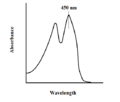Flavin adenine dinucleotide
Flavin adenine dinucleotide (FAD) is a redox cofactor involved in several important metabolic reactions. It is a molecule that is synthesized from riboflavin (vitamin B2) and adenosine triphosphate (ATP).
Structure[edit]
FAD consists of two major portions: the adenine and flavin moieties. The adenine portion is composed of a nitrogenous base attached to a five-carbon sugar, ribose, which is further connected to a chain of three phosphate groups. The flavin portion is a ring structure known as isoalloxazine, which is attached to the ribityl part of the molecule.
Function[edit]
FAD is a crucial component in oxidation-reduction reactions. It acts as a hydrogen acceptor in dehydrogenation reactions, becoming reduced to FADH2. This reduced form can then donate these hydrogen atoms in subsequent reactions, returning to its oxidized state.
Role in Metabolic Pathways[edit]
FAD is involved in several metabolic pathways, including:
- Krebs cycle: FAD is a key player in the Krebs cycle, where it is reduced to FADH2 in the succinate dehydrogenase reaction.
- Beta oxidation: In the process of beta oxidation, FAD is reduced to FADH2 during the oxidation of fatty acids.
- Electron transport chain: FADH2 donates its electrons to the electron transport chain, contributing to the production of ATP.
Deficiency[edit]
A deficiency in FAD can lead to a variety of health problems, including dermatitis, glossitis, and neurological symptoms. This is often due to a deficiency in dietary riboflavin, as the body cannot synthesize FAD without this vitamin.
See Also[edit]
|
|
|
-
Flavin_adenine_dinucleotide
-
Flavin_adenine_dinucleotide
-
Flavin_adenine_dinucleotide
-
Flavin_adenine_dinucleotide
-
Flavin_adenine_dinucleotide
-
Flavin_adenine_dinucleotide
-
Flavin_adenine_dinucleotide
-
Flavin_adenine_dinucleotide
-
Flavin_adenine_dinucleotide
-
Flavin_adenine_dinucleotide
-
Flavin_adenine_dinucleotide
-
Flavin_adenine_dinucleotide
Ad. Transform your life with W8MD's Budget GLP-1 injections from $75


W8MD offers a medical weight loss program to lose weight in Philadelphia. Our physician-supervised medical weight loss provides:
- Weight loss injections in NYC (generic and brand names):
- Zepbound / Mounjaro, Wegovy / Ozempic, Saxenda
- Most insurances accepted or discounted self-pay rates. We will obtain insurance prior authorizations if needed.
- Generic GLP1 weight loss injections from $75 for the starting dose.
- Also offer prescription weight loss medications including Phentermine, Qsymia, Diethylpropion, Contrave etc.
NYC weight loss doctor appointmentsNYC weight loss doctor appointments
Start your NYC weight loss journey today at our NYC medical weight loss and Philadelphia medical weight loss clinics.
- Call 718-946-5500 to lose weight in NYC or for medical weight loss in Philadelphia 215-676-2334.
- Tags:NYC medical weight loss, Philadelphia lose weight Zepbound NYC, Budget GLP1 weight loss injections, Wegovy Philadelphia, Wegovy NYC, Philadelphia medical weight loss, Brookly weight loss and Wegovy NYC
|
WikiMD's Wellness Encyclopedia |
| Let Food Be Thy Medicine Medicine Thy Food - Hippocrates |
Medical Disclaimer: WikiMD is not a substitute for professional medical advice. The information on WikiMD is provided as an information resource only, may be incorrect, outdated or misleading, and is not to be used or relied on for any diagnostic or treatment purposes. Please consult your health care provider before making any healthcare decisions or for guidance about a specific medical condition. WikiMD expressly disclaims responsibility, and shall have no liability, for any damages, loss, injury, or liability whatsoever suffered as a result of your reliance on the information contained in this site. By visiting this site you agree to the foregoing terms and conditions, which may from time to time be changed or supplemented by WikiMD. If you do not agree to the foregoing terms and conditions, you should not enter or use this site. See full disclaimer.
Credits:Most images are courtesy of Wikimedia commons, and templates, categories Wikipedia, licensed under CC BY SA or similar.
Translate this page: - East Asian
中文,
日本,
한국어,
South Asian
हिन्दी,
தமிழ்,
తెలుగు,
Urdu,
ಕನ್ನಡ,
Southeast Asian
Indonesian,
Vietnamese,
Thai,
မြန်မာဘာသာ,
বাংলা
European
español,
Deutsch,
français,
Greek,
português do Brasil,
polski,
română,
русский,
Nederlands,
norsk,
svenska,
suomi,
Italian
Middle Eastern & African
عربى,
Turkish,
Persian,
Hebrew,
Afrikaans,
isiZulu,
Kiswahili,
Other
Bulgarian,
Hungarian,
Czech,
Swedish,
മലയാളം,
मराठी,
ਪੰਜਾਬੀ,
ગુજરાતી,
Portuguese,
Ukrainian






